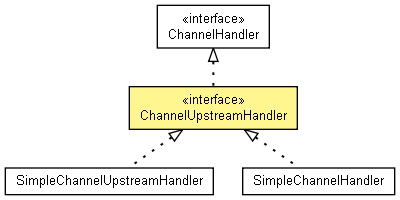
|
||||||||||
| PREV CLASS NEXT CLASS | FRAMES NO FRAMES | |||||||||
| SUMMARY: NESTED | FIELD | CONSTR | METHOD | DETAIL: FIELD | CONSTR | METHOD | |||||||||
public interface ChannelUpstreamHandler

Handles or intercepts an upstream ChannelEvent, and sends a
ChannelEvent to the next handler in a ChannelPipeline.
An upstream event is an event which is supposed to be processed by
a series of upstream handlers in the the ChannelPipeline.
The upstream events are generated by an I/O thread, and they have the
following meaning:
| Event name | Event type and condition | Meaning |
|---|---|---|
"messageReceived" |
MessageEvent |
a message object (e.g. ChannelBuffer) was received from a remote peer |
"exceptionCaught" |
ExceptionEvent |
an exception was raised by an I/O thread or a ChannelHandler |
"channelOpen" |
ChannelStateEvent(state = OPEN, value = true) |
a Channel is open, but not bound nor connected |
"channelClosed" |
ChannelStateEvent(state = OPEN, value = false) |
a Channel was closed and all its related resources were released |
"channelBound" |
ChannelStateEvent(state = BOUND, value = SocketAddress) |
a Channel is open and bound to a local address, but not connected |
"channelUnbound" |
ChannelStateEvent(state = BOUND, value = null) |
a Channel was unbound from the current local address |
"channelConnected" |
ChannelStateEvent(state = CONNECTED, value = SocketAddress) |
a Channel is open, bound to a local address, and connected to a remote address |
"writeComplete" |
WriteCompletionEvent |
something has been written to a remote peer |
"channelDisconnected" |
ChannelStateEvent(state = CONNECTED, value = null) |
a Channel was disconnected from its remote peer |
"channelInterestChanged" |
ChannelStateEvent(state = INTEREST_OPS, no value) |
a Channel's interestOps was changed |
These two additional event types are used only for a parent channel which
can have a child channel (e.g. ServerSocketChannel).
| Event name | Event type and condition | Meaning |
|---|---|---|
"childChannelOpen" |
ChildChannelStateEvent( childChannel.isOpen() = true) |
a child Channel was open (e.g. a server channel accepted a connection.) |
"childChannelClosed" |
ChildChannelStateEvent( childChannel.isOpen() = false) |
a child Channel was closed (e.g. the accepted connection was closed.) |
You might want to refer to ChannelDownstreamHandler to see how a
ChannelEvent is interpreted when going downstream. Also, please
refer to the ChannelEvent and ChannelPipeline documentation
to find out what an upstream event and a downstream event are, what
fundamental differences they have, and how they flow in a pipeline.
SimpleChannelHandler
In most cases, you will get to use a SimpleChannelHandler to
implement an upstream handler because it provides an individual handler
method for each event type. You might want to implement this interface
directly though if you want to handle various types of events in more
generic way.
You can forward the received event upstream or downstream. In most cases,
ChannelUpstreamHandler will send the event upstream (i.e. inbound)
although it is legal to send the event downstream (i.e. outbound):
// Sending the event upstream (inbound) void handleUpstream(ChannelHandlerContextctx,ChannelEvente) throws Exception { ... ctx.sendUpstream(e); ... } // Sending the event downstream (outbound) void handleDownstream(ChannelHandlerContextctx,ChannelEvente) throws Exception { ... ctx.sendDownstream(new MessageEvent(...)); ... }
You will also find various helper methods in Channels to be useful
to generate and send an artificial or manipulated event.
If there's no ExecutionHandler in the ChannelPipeline,
handleUpstream
will be invoked sequentially by the same thread (i.e. an I/O thread).
Please note that this does not necessarily mean that there's a dedicated
thread per Channel; the I/O thread of some transport can serve more
than one Channel (e.g. NIO transport), while the I/O thread of
other transports can serve only one (e.g. OIO transport).
If an ExecutionHandler is added in the ChannelPipeline,
handleUpstream
may be invoked by different threads at the same time, depending on what
Executor implementation is used with the ExecutionHandler.
OrderedMemoryAwareThreadPoolExecutor is provided to guarantee the
order of ChannelEvents. It does not guarantee that the invocation
will be made by the same thread for the same channel, but it does guarantee
that the invocation will be made sequentially for the events of the same
channel. For example, the events can be processed as depicted below:
-----------------------------------> Timeline ----------------------------------->
Thread X: --- Channel A (Event 1) --. .-- Channel B (Event 2) --- Channel B (Event 3) --->
\ /
X
/ \
Thread Y: --- Channel B (Event 1) --' '-- Channel A (Event 2) --- Channel A (Event 3) --->
Also, please refer to the ChannelPipelineCoverage annotation to
understand the relationship between a handler and its stateful properties.
| Method Summary | |
|---|---|
void |
handleUpstream(ChannelHandlerContext ctx,
ChannelEvent e)
Handles the specified upstream event. |
| Method Detail |
|---|
void handleUpstream(ChannelHandlerContext ctx,
ChannelEvent e)
throws Exception
ctx - the context object for this handlere - the upstream event to process or intercept
Exception
|
||||||||||
| PREV CLASS NEXT CLASS | FRAMES NO FRAMES | |||||||||
| SUMMARY: NESTED | FIELD | CONSTR | METHOD | DETAIL: FIELD | CONSTR | METHOD | |||||||||